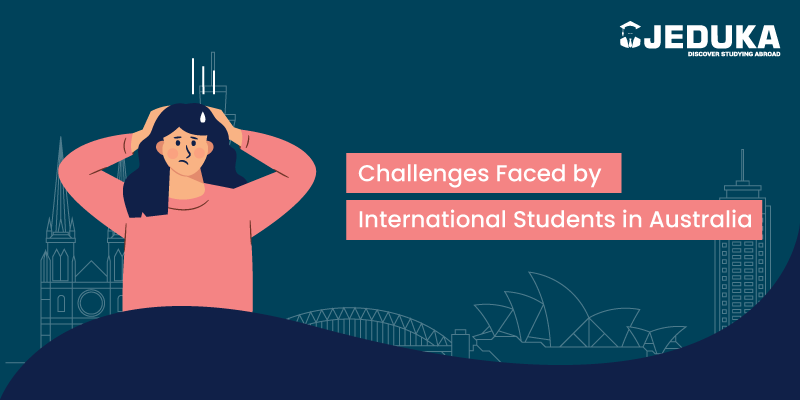Published Date: 23rd February 2023
Australia is a popular destination for international students seeking a quality education and a better future. According to the latest figures from the Department of Education and Training, there are 500,000 international students studying in Australia. However, studying abroad comes with its own set of challenges, and international students in Australia are not exempt from facing difficulties. In this blog, we will explore some of the challenges faced by international students in Australia and how they can overcome them.

1. Language Barriers
One of the biggest challenges that international students face when studying in Australia is language barriers. Although English is the primary language in Australia, students from non-English speaking countries may find it difficult to communicate effectively with their peers and professors. This can lead to a feeling of isolation and hinder their academic performance.
To overcome language barriers, international students should consider enrolling in English language courses before starting their studies. Most universities and colleges offer English language courses specifically designed for international students to improve their English language skills. Additionally, they can participate in language exchange programs or join clubs and organizations to practice their language skills with native speakers.
2. Cultural Differences
Another challenge that international students face is cultural differences. Australia is a multicultural country, and students from different parts of the world may find it challenging to adjust to the local culture. For instance, social norms, customs, and traditions may be different from what they are used to, leading to culture shock.
To overcome cultural differences, international students should be open to new experiences and embrace diversity. They should make an effort to learn about Australian culture, customs, and traditions, and participate in cultural activities and events. This will not only help them adjust to the local culture but also enable them to develop cross-cultural communication skills, which are highly valued in today's globalized world.
3. Financial Challenges
Studying abroad can be expensive, and international students in Australia face significant financial challenges. The cost of living, including accommodation, food, transportation, and healthcare, is higher in Australia than in many other countries. Additionally, international students are not eligible for government funding, such as student loans and grants, and must rely on their own resources.
To overcome financial challenges, international students should plan their budget carefully and look for ways to save money. They should consider sharing accommodation with other students, cooking their meals instead of eating out, and taking advantage of student discounts on transportation and entertainment. Additionally, they can look for part-time jobs or internships to supplement their income.

4. Homesickness
Homesickness is another challenge that international students in Australia may face. Being away from family and friends and living in a new environment can be overwhelming, leading to feelings of loneliness and isolation.
To overcome homesickness, international students should stay connected with their loved ones back home through regular communication. They can use technology, such as video calls and instant messaging, to stay in touch with family and friends. Additionally, they can participate in social activities and events on campus to meet new people and make friends.
5. Academic Pressure
International students in Australia may face academic pressure due to the rigorous academic standards and expectations. The education system in Australia is highly competitive, and students are expected to perform well in exams and assignments. Moreover, the language barrier and cultural differences can add to the academic pressure.
To overcome academic pressure, international students should seek academic support services provided by their universities or colleges. These may include tutoring, study groups, and academic writing workshops. Additionally, they can develop effective study habits, such as time management, note-taking, and active listening, to improve their academic performance.
6. Work-Life Balance
International students in Australia may find it challenging to balance their academic and personal lives. The pressure to perform well academically, combined with social activities and part-time jobs, can lead to a lack of sleep and stress.
To overcome work-life balance challenges, international students should prioritize their time and set realistic goals. They should make a schedule that includes time for studying, socializing, and self-care activities, such as exercise and meditation. Additionally, they can seek support from their peers, professors, and counselors if they feel overwhelmed.

7. Discrimination and Racism
Unfortunately, international students in Australia may also face discrimination and racism. This can be due to their race, ethnicity, religion, or nationality, and can have a significant impact on their mental health and well-being.
To overcome discrimination and racism, international students should know their rights and report any incidents of discrimination to their universities or colleges. They can also seek support from advocacy groups and organizations that provide support to international students who have experienced discrimination. Additionally, they can connect with other international students who share similar experiences and form a support network.
8. Health Issues
In addition to the challenges mentioned above, international students in Australia may also face health issues. This can be due to a lack of access to healthcare, pre-existing health conditions, or difficulty adjusting to the Australian climate. Health issues can range from minor illnesses to more serious conditions and can have a significant impact on student's academic and personal lives.
To overcome health issues, international students should be aware of the healthcare options available to them in Australia. Most universities in Australia and colleges provide health services, including medical consultations, vaccinations, and mental health support. Additionally, international students should consider purchasing health insurance to cover any medical expenses they may incur while in Australia. They should also take care of their physical and mental health by getting enough sleep, eating a balanced diet, exercising regularly, and seeking support if they feel overwhelmed.
Conclusion
International students in Australia face several challenges, including language barriers, cultural differences, financial challenges, homesickness, academic pressure, work-life balance, and discrimination and racism. However, with the right support and resources, they can overcome these challenges and have a successful academic and personal experiences in Australia. It is essential for universities, colleges, and the Australian government to provide adequate support to international students to ensure their well-being and academic success. Ultimately, international students play a vital role in the cultural diversity and economic growth of Australia, and their contributions should be recognized and valued.

1. What are some common challenges faced by international students in Australia?
Some common challenges faced by international students in Australia include adapting to a new academic system, cultural differences, language barriers, financial difficulties, and social isolation.
2. How can international students find affordable housing options in Australia?
International students can find affordable housing options in Australia by researching different housing options such as on-campus housing, shared accommodation, or homestays. It is also important to budget carefully and to seek advice from their university's international student office or housing services.
3. What should international students do if they experience academic difficulties or struggles in Australia?
International students should seek support from their professors or academic advisors if they experience academic difficulties or struggles in Australia. They can also utilize academic resources such as tutoring, study groups, or writing centers to help improve their academic performance.
4. What are some tips for international students to overcome social isolation and homesickness in Australia?
Some tips for international students to overcome social isolation and homesickness in Australia include participating in social events or activities, joining student clubs or organizations, staying connected with loved ones back home, and exploring the local community and culture.
5. How can international students find employment or internship opportunities in Australia?
International students can find employment or internship opportunities in Australia by utilizing resources available at their university such as career services or job boards, networking with professionals in their field, and researching job opportunities online or through industry-specific organizations.
6. How can international students manage the high cost of living in Australia?
International students can manage the high cost of living in Australia by budgeting carefully, researching affordable housing and transportation options, seeking part-time employment if eligible, and applying for scholarships or financial aid if available.
7. What should international students do if they experience discrimination or harassment in Australia?
International students should report any instances of discrimination or harassment to their university's diversity and inclusion office or to local law enforcement. It is important to document any incidents and to seek support from trusted individuals or resources to ensure their safety and well-being.
8. What are some cultural differences that international students may encounter in Australia?
Some cultural differences that international students may encounter in Australia include differences in communication styles, social customs, and expectations for academic and professional behavior. It is important for international students to be aware of these differences and to seek guidance or support if needed.
9. How can international students navigate the visa and immigration process in Australia?
International students can navigate the visa and immigration process in Australia by researching and understanding the requirements for their specific visa type, staying informed about any changes or updates to immigration policies, seeking assistance from their university's international student office, and consulting with an immigration attorney if needed.
10. What should international students do if they face health or medical issues while studying in Australia?
International students should utilize the health and medical services available at their university or seek medical attention from local healthcare providers if they experience health or medical issues while studying in Australia. It is important for international students to have adequate health insurance coverage to ensure they can access necessary medical care.
11. How can international students manage the academic workload and expectations in Australia?
International students can manage the academic workload and expectations in Australia by developing effective time management and study skills, seeking academic support from professors or tutors, and understanding the grading system and academic requirements for their courses.
12. What are some tips for international students to manage homesickness while studying in Australia?
Some tips for international students to manage homesickness while studying in Australia include staying connected with loved ones back home through technology, creating a routine or schedule for self-care and relaxation, and seeking support from friends, family, or counseling services if needed.
13. How can international students prepare for the Australian job market after graduation?
International students can prepare for the Australian job market after graduation by developing relevant skills and experience through internships, volunteer work, or part-time employment, networking with professionals in their field, and researching job opportunities and industry trends. It is also important to understand the visa and work permit requirements for working in Australia.
14. What are some tips for international students to improve their language skills in Australia?
Some tips for international students to improve their language skills in Australia include practicing regularly with native speakers, attending language exchange or conversation groups, watching TV shows or movies in the target language, and reading books or news articles in the target language. Language classes or tutoring services may also be available through the university or local language schools.
15. How can international students navigate the Australian education system and academic culture?
International students can navigate the Australian education system and academic culture by researching the expectations and norms for academic behavior, communicating with professors or academic advisors for clarification or guidance, and participating in orientation or information sessions offered by the university.
16. What are some tips for international students to make the most of their study abroad experience in Australia?
Some tips for international students to make the most of their study abroad experience in Australia include staying open-minded and adaptable, immersing oneself in the local culture and community, taking advantage of opportunities for travel and exploration, and connecting with other international or local students for support and friendship. It is also important to balance academic responsibilities with personal growth and enjoyment.
Read Also
How to Obtain Bachelor's Degree in Australia?
How to Solve the Problems While Studying Abroad in Australia?
Career Opportunities After Studying in Australia









Categories: Australia
Tags: Study Abroad